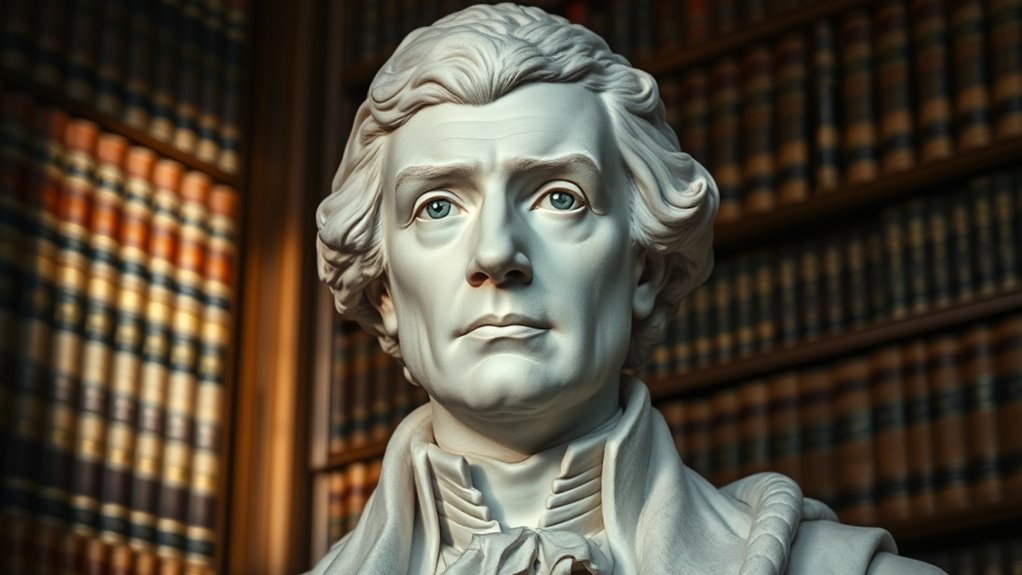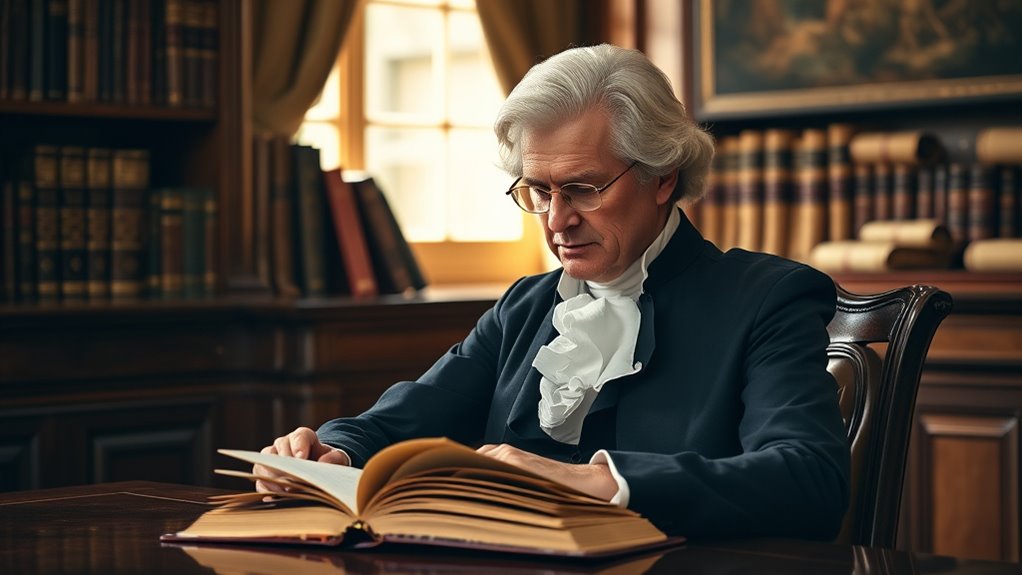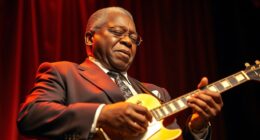Thomas Jefferson believed that if you don’t engage deeply with ideas, you miss out on understanding the core principles that shape society. He emphasized the importance of focusing on key concepts to grasp political philosophy and protect individual rights. Without committing yourself to learning, your understanding remains superficial, and your appreciation for freedom weakens. If you want to uncover how Jefferson’s ideas continue to influence us today, keep exploring these foundational principles.
Key Takeaways
- Jefferson believed focused reading of key ideas was essential for understanding complex political principles.
- His selective reading exemplified the importance of deep engagement with foundational texts.
- Limited reading could hinder grasping the full scope of natural rights and democratic ideals.
- His writings emphasize that knowledge, gained through reading, fuels political wisdom and effective leadership.
- Recognizing the dangers of superficial knowledge aligns with Jefferson’s emphasis on informed citizenry and education.

Have you ever wondered who authored the Declaration of Independence and shaped the early future of the United States? It was Thomas Jefferson, a man whose influence extends far beyond that historic document. Jefferson’s role in establishing the nation’s Founding Principles is undeniable, but understanding his political philosophy reveals even more about his vision for America. His ideas about liberty, individual rights, and government’s role continue to resonate today, making him a pivotal figure in American history.
Jefferson believed that a government’s legitimacy depends on its ability to serve the people’s natural rights. His political philosophy was rooted in Enlightenment ideals, emphasizing reason, liberty, and the pursuit of happiness. You might find it interesting that these principles weren’t just lofty ideals for Jefferson—they directly shaped the Constitution and the Bill of Rights. His writings reflect a conviction that government should be a protector of these rights, not an oppressor. This belief is embedded in the very founding of the nation, guiding policies and political debates for generations.
Jefferson’s core belief: government must protect natural rights, shaping America’s founding principles and guiding policies for generations.
Jefferson’s focus on Founding Principles wasn’t merely theoretical. He actively worked to guarantee that these ideals were woven into the fabric of the nation’s laws. When you study his life, you see a man committed to education and knowledge, believing that an informed citizenry was essential to maintaining a free society. Yet, paradoxically, Jefferson was known to read selectively, often favoring certain texts over others. Despite this, his grasp of political philosophy was profound, guiding his efforts to promote democracy and individual rights. Interestingly, reading selectively was a reflection of his belief that focusing on key ideas was crucial for understanding complex principles.
You might also hear critics say Jefferson’s actions didn’t always align perfectly with his principles. That’s true, but it doesn’t diminish the core ideas he championed. His writings and policies reflect a man who understood that reading too little can limit your understanding—hence the famous admonition that “The man who reads too little has no advantage.” In Jefferson’s case, it was a reminder that knowledge fuels political wisdom. To truly grasp the Founding Principles, you need to engage deeply with the ideas that underpin them.
Frequently Asked Questions
Did Jefferson’s Reading Habits Change Over His Lifetime?
You’ll find that Jefferson’s reading habits evolved considerably over his lifetime, driven by his passion for learning. His early years sparked a curiosity that grew into extensive library development, reflecting his commitment to acquiring knowledge. As he aged, his reading became more deliberate and focused, demonstrating a clear reading evolution. This change allowed him to deepen his understanding and influence various fields, underscoring the importance of continual learning.
What Genres of Books Did Jefferson Prefer?
Imagine opening a treasure chest of knowledge—that’s what Jefferson’s reading preferences reveal. You find he favored diverse book genres, from political philosophy to science and architecture, reflecting a curious mind keen to explore. His love for history and literature shows he valued both practical insights and the beauty of storytelling. By diving into these genres, Jefferson expanded his understanding, proving that a broad reading palette fuels a sharper, more enlightened perspective.
How Did Jefferson’s Limited Reading Affect His Political Decisions?
You see, Jefferson’s limited reading depth restricted his intellectual breadth, which impacted his political decisions. By not exploring a wide range of ideas, he sometimes lacked nuanced understanding of complex issues. This meant his policies were influenced more by personal beliefs than thorough knowledge. As a result, his decisions weren’t always well-rounded, highlighting how vital extensive reading is for informed, balanced leadership.
Was Jefferson Involved in Any Literary or Scholarly Societies?
You’ll find that Jefferson was actively involved in scholarly societies, which helped him expand his knowledge. He was passionate about book collecting, and his extensive library reflected his scholarly interests. Jefferson participated in various literary and scholarly societies, exchanging ideas and promoting learning. These memberships allowed him to stay connected with other intellectuals, broadening his perspectives and enhancing his influence in political and cultural spheres.
How Did Jefferson Acquire His Books and Library?
You can see that Jefferson acquired his books through various means, including purchases, gifts, and exchanges, which greatly contributed to his library development. He actively sought out rare and valuable volumes, enhancing his collection’s depth. By continuously expanding his library, Jefferson guaranteed access to diverse knowledge, reinforcing his reputation as a well-read scholar. His dedication to book acquisition played a vital role in shaping his intellectual legacy.
Conclusion
If you want to truly succeed, remember Jefferson’s words: “The man who reads too little has no advantage.” Did you know he read over 1,000 books in his lifetime? That’s a clear reminder that continuous learning gives you a significant edge. So, make it a habit to read daily. Your knowledge, growth, and opportunities depend on it. Don’t let laziness or distraction hold you back—embrace reading and unleash your full potential.
Joy, as our Editor in Chief, ensures the highest standard of content. Her talent in writing is complemented by her attention to detail and passion for literature and culture. Joy’s expertise and love for the English language shine through in her editorial work, making each piece a testament to quality and clarity.









